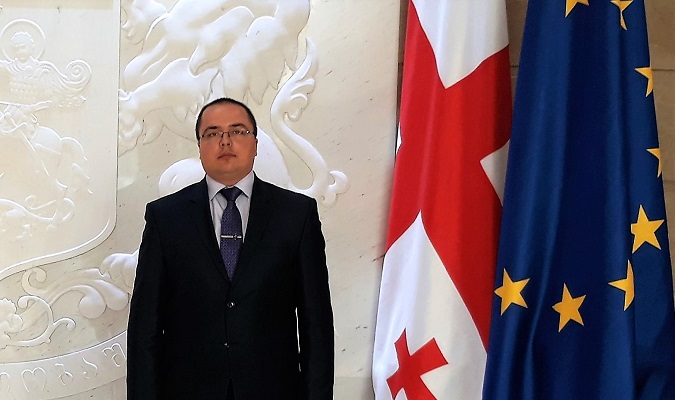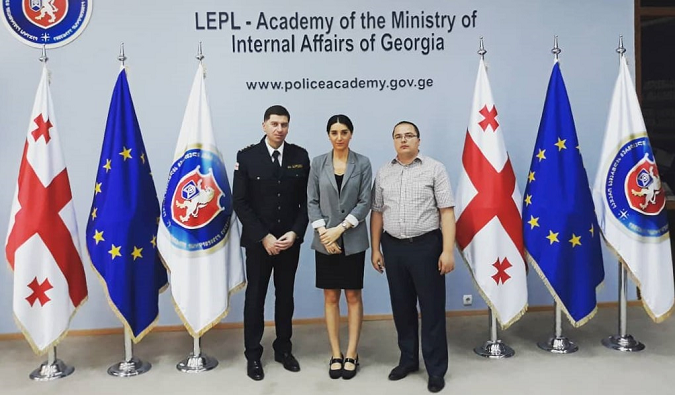Captain of Justice Alexandru Drăgulean: “Promoting women in defense sector, especially in leadership positions, is a proof of a mature democracy”
15 Government and civil society representatives from Moldova participated in a study visit in Georgia in May 2018, regarding the National Action Plan implementing the Resolution 1325 of the UN Security Council on Women, Peace and Security. The mission, organised by UN Women with the financial support of the Government of Sweden, aimed to strengthen the dialogue and exchange of best practices between Moldova and Georgia in promoting women, peace and security, through National Action Plans on Resolution 1325. To learn more about the conclusions of this visit and why women's presence in peace and security area is important, we discussed with Captain of Justice Alexandru Dragulean, Senior Specialist at Human Resources Development and Military Education Policy Directorate of the Ministry of Defense of the Republic of Moldova, one of the participants in the study visit.Date:

– Dear Mr. Alexandru Drăgulean, what are your impressions on the study visit in Georgia focused on the National Action Plan Implementing the Resolution 1325 of the UN Security Council on Women, Peace and Security?
– What I found most fascinating was the enthusiasm of Georgian civil society representatives who are actively involved in monitoring and assessing the way public authorities implement the National Action Plan on the Resolution 1325 of the UN Security Council on Women, Peace and Security. I was also pleasantly surprised that absolutely all state institutions (Parliament, Government, line ministries, education institutions of the Ministry of Defense and of the Ministry of Internal Affairs) are involved in solving the issues reflected in the Resolution 1325.
The openness of both Georgian and Ukrainian colleagues, who participated in this study visit, the way they shared their experience in implementing the provisions at national level (positive practices, risks and challenges, failures, lessons learned, etc.) inspired me and made me confident that the Republic of Moldova is also likely to successfully implement this international document.
– What can Moldova learn or adopt from the Georgian and Ukrainian colleagues regarding the National Action Plan Implementing the Resolution 1325 of the UN Security Council on Women, Peace and Security?
– Based on the experience shared by colleagues from Georgia and Ukraine, I believe that it would be appropriate to adopt such practices as: review the public policy documents and legislative/normative acts from the perspective of gender mainstreaming; establish a ‘gender adviser’ position at all levels (strategic, operational, tactical) within the national defense structures, and consider creating a specialized subdivision responsible for gender issues within the institution; train gender trainers certified abroad for the national defense structures; train the senior staff of the national defense structures on gender equality and strengthen their capacity to analyse the acts/decisions from gender lens; involve actively the civil society in implementing the Resolution 1325, including in monitoring and assessing the implementation of the National Action Plan; educate continuously the public on the culture of peace and promote the activities performed by women in international peacekeeping missions/operations; include topics on gender-based discrimination, preventing sexual and gender-based violence in the educational curricula; increase women’s representation in the formal and informal peace negotiations, mediation and peacekeeping missions; ensure conditions for the recovery, recreation, physical and mental rehabilitation of the military staff (men and women) who participated in peacekeeping missions/operations.

– What is the Republic of Moldova proud of regarding the implementation of the Resolution 1325 and the promotion of gender equality within security and defense institutions?
– The Ministry of Defense has taken actions to ensure the implementation of the Resolution 1325 of UN Security Council on Women, Peace and Security. Currently, 17% of the total number of soldiers and 61% of all civilian personnel of the National Army are women. This percentage is much lower in other countries across the world. Currently, the enrollment of women, who opt for a military career as officers, at the Military Academy ‘Alexandru cel Bun’ is possible at all military specialties. Previously, female students were trained only in one specialty within the Academy. In 2017, 11 female students graduated military specialties at this institution. The number of female candidates who chose to study at the Military Academy has steadily increased every year.
In addition, in 2018, 20% of the total number of military observers/officers in general staff positions, provided to the Republic of Moldova in UN peacekeeping missions, were offered exclusively to women in the military service. For the remaining positions, both men and women may apply. Currently, two women from the National Army of the Republic of Moldova – Major Elena Milcenco and Major Natalia Lefter – are on international missions in Africa as military observers.
I would also like to mention the launch of the ‘Gender Dimension in the Security and Defense Area’ textbook, written by Natalia Albu, PhD in Political Science, Associate Professor at the Armed Forces Military Academy ‘Alexandru cel Bun’, with the support of UN Women Moldova. This textbook is intended for the Military Academy teachers as well as for trainers who are training the contingents to be seconded in international peacekeeping missions and operations.
– How can the culture of gender equality be promoted in peace and security area?
– The culture of gender equality in peace and security area can be promoted primarily through awareness-raising and informing the general public, but also through the exchange of experience with national and international partners.
– Why is women’s presence in peace and security area important?
– Equal opportunities for men and women is a priority both at international level – within UN, EU, NATO, OSCE entities, and at national level. Women’s presence in peace and security contributes to effective missions and operations. Hence, it should be considered at all stages of planning, implementing and assessing a mission. Women’s integration into security and defense is irreversible and proves to be a success. However, sustained efforts to further the policies and actions aimed at supporting gender equality are needed. Promoting women, especially in leadership positions, is a challenge and a proof of a mature democracy throughout the world.
– What are the plans of the Ministry of Defense on promoting women in peace and security area?
– Currently, the Ministry of Defense is developing the Action Plan to implement within the National Army the provisions of the National Action Plan on the Resolution 1325 for 2018-2021. This document will include specific actions to be conducted by the Ministry in order to implement the Resolution 1325.
– Thank you!